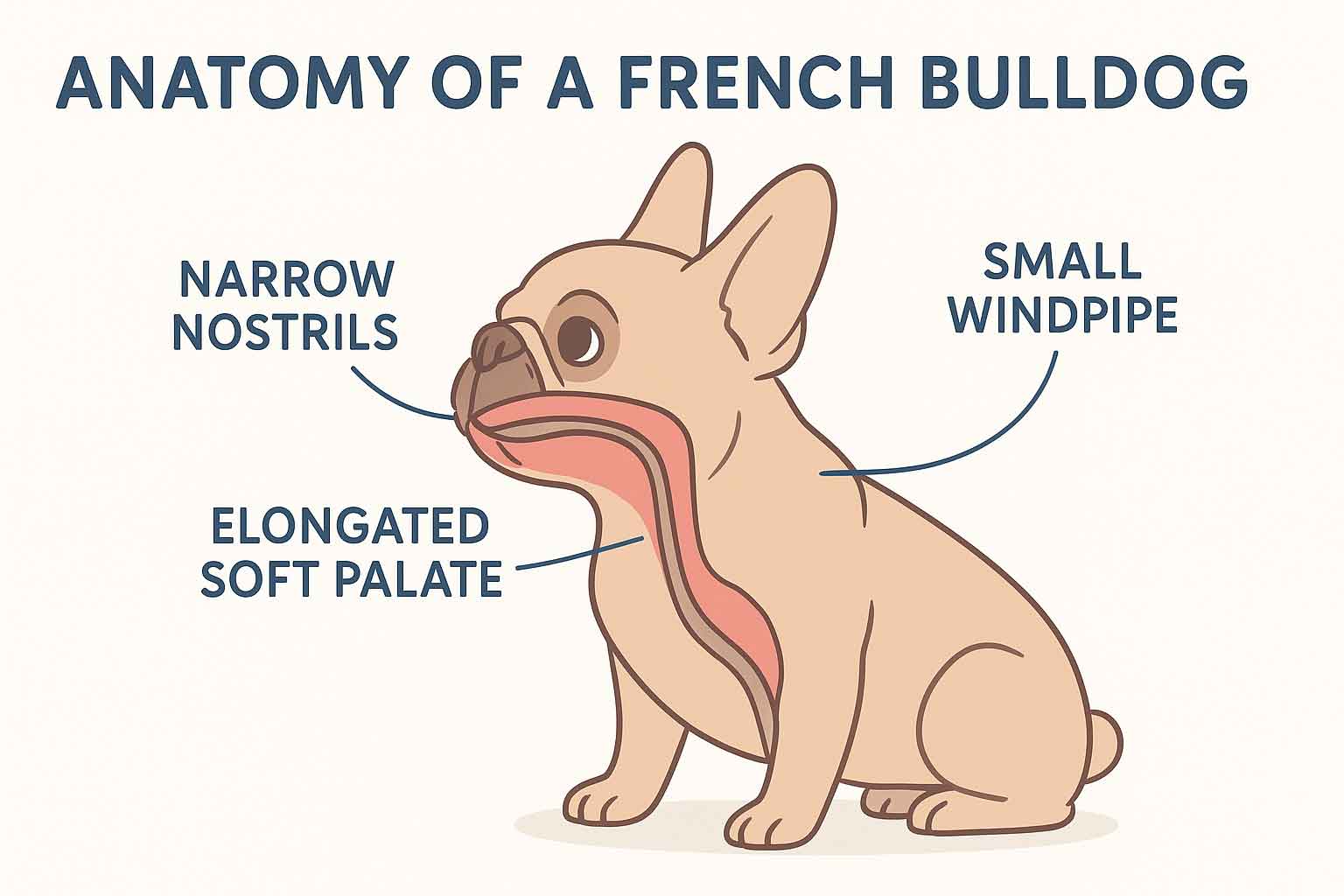How to Manage Breathing Issues in French Bulldogs
French Bulldogs are adorable, loving, and full of personality—but their flat faces come with a downside: breathing problems. If you’re a Frenchie owner or thinking about adopting one, it’s important to know how to manage breathing issues in French Bulldogs.
These breathing difficulties aren’t just annoying snoring or heavy panting—they can lead to serious health risks. Understanding the causes, symptoms, and treatment options can help your Frenchie live a longer, happier life.
Why Is My French Bulldog Struggling to Breathe?
Many French Bulldogs suffer from a condition called BOAS (Brachycephalic Obstructive Airway Syndrome). Because of their flat faces and short noses, they often have narrow nostrils, long soft palates, and small windpipes. These features can make it harder for them to breathe.
Some Frenchies are born with mild symptoms, while others may struggle to breathe during exercise, in hot weather, or even while resting.
Common French Bulldog BOAS Symptoms
Here are signs to watch for:
- Noisy breathing, wheezing, or snoring
- Breathing sounds congested
- Struggling during walks or play
- Panting more than normal
- Breathing fast while resting
- Gagging, choking, or trouble swallowing
- Gums or tongue turning blue or purple (this is an emergency)
If your Frenchie breathing sounds congested or they’re showing any of the above signs, contact your vet immediately. Early care makes a big difference.
How to Manage Breathing Issues in French Bulldogs While Staying Safe
You can’t change your dog’s anatomy, but you can make life easier for them. Here’s how to manage mild to moderate breathing issues:
-
Keep Your Frenchie at a Healthy Weight
Extra weight puts pressure on their already narrow airways. Feed a balanced diet, avoid table scraps, and follow your vet’s feeding recommendations.
-
Limit Exercise
Avoid long walks or intense play. Short 10–15-minute walks are enough. For puppies, only walk them 2 minutes per month of age (e.g., 4-month-old = 8-minute walk).
If your Frenchie starts breathing fast or seems tired, stop immediately and carry them home.
-
Avoid the Heat
French Bulldogs don’t tolerate hot weather well. They can’t cool down like other dogs because of their short noses. Walk them early in the morning or late in the evening, and always keep them in air-conditioned spaces on hot days.
-
Use a Harness, Not a Collar
Collars can put pressure on their throat. Use a harness to reduce strain while walking your dog.
-
Slow Down Feeding
Some Frenchies struggle to breathe and eat at the same time. Use a slow feeder bowl or feed smaller meals throughout the day. This can help prevent choking and regurgitation.
What to Do During a Frenchie Breathing Attack
If your Frenchie suddenly can’t catch their breath, panics, or breathes with an open mouth while at rest, they may be having a breathing attack.
Stay calm and take action:
- Move them to a cool, quiet place
- Keep them still and calm
- Offer water, but don’t force it
- Call your vet immediately
Severe cases may need emergency care or even oxygen therapy.
Does My Frenchie Need Surgery?
For some dogs, lifestyle changes aren’t enough. If symptoms are severe, your vet may recommend French Bulldog breathing surgery.
This surgery can involve:
- Widening the nostrils (stenotic nares)
- Trimming the soft palate
- Removing tissue from the airway
It can drastically improve your Frenchie’s quality of life.
French Bulldog Breathing Surgery Cost
In the U.S., the cost of BOAS surgery can range from $1,500 to $4,000 depending on your location, the severity of your dog’s condition, and the clinic.
Some clinics offer minimally invasive techniques, which reduce surgery time and allow for faster recovery. Always ask your vet about options, costs, and success rates.
Final Thoughts
How to manage breathing issues in French Bulldogs comes down to understanding their needs and acting early. While their cute faces are part of their charm, they come with serious health responsibilities. Monitor symptoms, avoid heat and overexertion, feed carefully, and always talk to your vet if something doesn’t feel right.
If you ever ask yourself, “Why is my French Bulldog struggling to breathe?“, don’t ignore it. Your awareness could save their life.
🐾 Frequently Asked Questions About French Bulldog Breathing Issues
Q: How can I help my French Bulldog breathe better?
A: Start with small changes that make a big difference. Keep your Frenchie at a healthy weight, avoid hot weather, and skip long walks. Use a harness instead of a collar to reduce throat pressure. Feeding smaller meals slowly and avoiding stress also helps. If your dog is still having trouble, your vet may recommend surgery to open the airways.
Q: When should I worry about my French Bulldog’s breathing?
A: If your Frenchie is breathing heavily while resting, wheezing, or making loud snoring-like sounds while awake, it’s time to pay attention. Blue gums, open-mouth breathing, or collapsing are all emergency signs. Even milder symptoms like regular snoring or tiredness after short walks should be checked by a vet. It could be a sign of BOAS (Brachycephalic Obstructive Airway Syndrome).
Q: How do I help my dog who is struggling to breathe?
A: First, stay calm. Move your dog to a cool, quiet area, and keep them still. Offer a small amount of water and call your vet right away. Breathing distress is serious and can worsen quickly, especially in French Bulldogs. Your vet may suggest oxygen therapy, medication, or surgery depending on the severity.
Q: Why is my French Bulldog’s breath so bad?
A: Bad breath in Frenchies is often caused by dental issues, like plaque buildup, gum disease, or food stuck in their teeth. However, it can also be a result of mouth breathing due to airway problems. If the bad breath comes with breathing difficulties, drooling, or difficulty eating, schedule a vet checkup. Dental cleanings, tooth brushing, or a diet change might help too.

